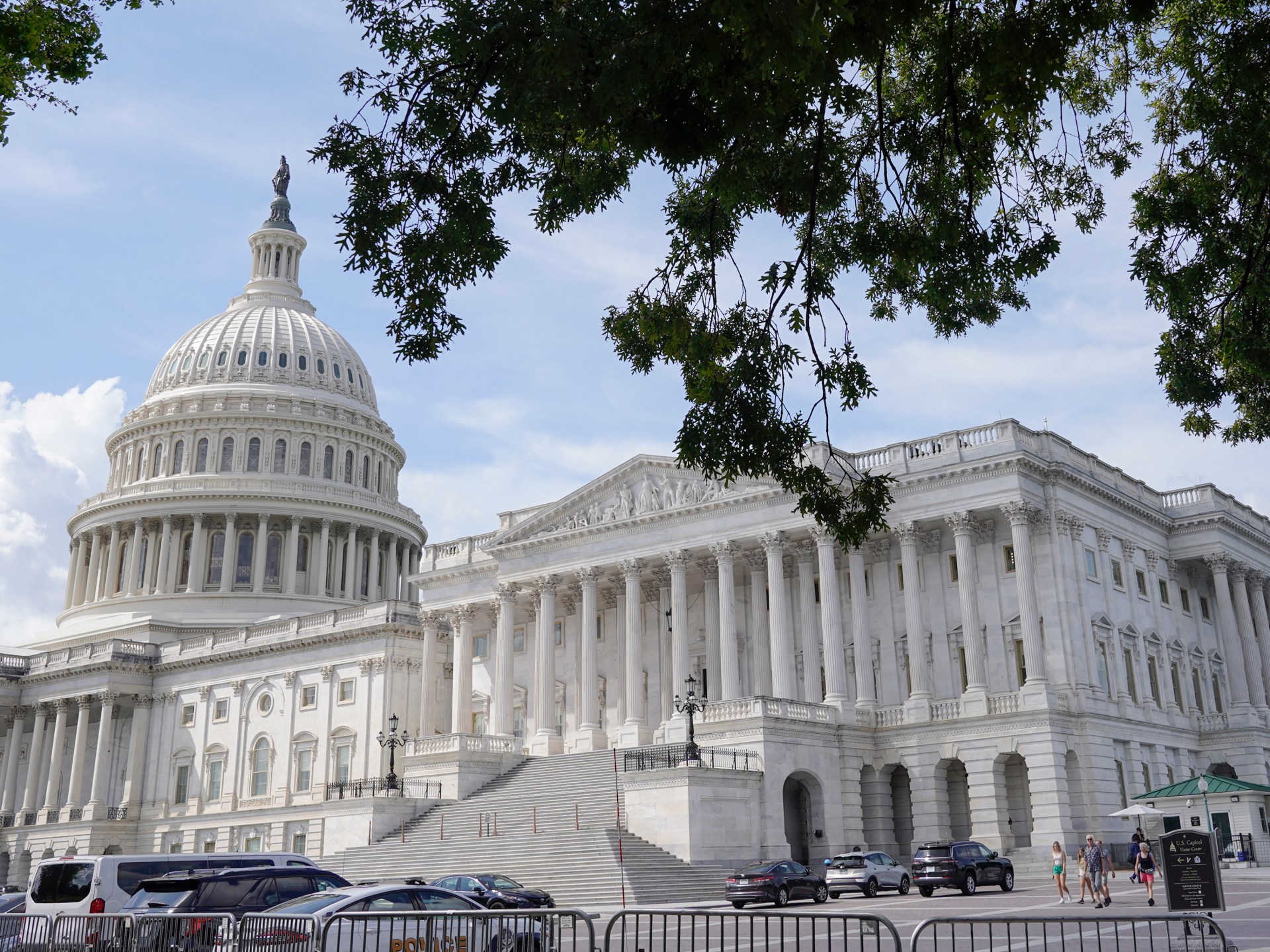Legislators in the United States have little time left to avert a federal government shutdown, as a group of hardline Republicans has refused to support must-pass funding legislation unless massive spending cuts are made.
The hard-right Republicans in the House of Representatives – many of whom are allies of former President Donald Trump – have refused to support a bipartisan stopgap spending bill meant to give lawmakers more time to negotiate a full-year deal.
Republican House Speaker Kevin McCarthy has tried to get the right flank of his party to support the measure before a midnight deadline on Saturday (04:00 GMT on Sunday) but has not succeeded so far.
If he turns to Democrats for help in passing the bipartisan bill, the hardline Republicans would have a way to remove him as speaker.
In the meantime, the country is staring down a possible government shutdown – the fourth in a decade – that would see hundreds of thousands of federal workers furloughed, among other wide-reaching effects.
Here’s all you need to know about what a federal government shutdown means and who will be affected.
What is a government shutdown?
A government shutdown happens when Congress does not approve discretionary spending for the upcoming fiscal year, which begins on October 1.
A shutdown affects nearly every corner of the US government, from the delivery of welfare cheques and publishing of national economic data to the operation of federal courts, museums and national parks.
Hundreds of thousands of federal workers likely would be furloughed – temporarily forced to leave work without pay – while workers deemed essential would remain on the job but continue without a paycheque.
How many workers will be affected?
During the last shutdown, about 800,000 workers were furloughed, USA Today reported. “This time around, the ripple effect may extend even further, resulting in an even larger number of furloughed workers,” the outlet said.
This includes workers across federal government agencies, including the Department of Defense, as well as members of the US military. “All of this would prove disruptive to our national security,” the White House warned this week.
John Hubert, an airport security officer in Florida who has worked at the Transportation Security Administration (TSA) for 21 years, said federal workers are “continuously put on the chopping block”.
“It’s ridiculous,” Hubert told The Associated Press. “We should not be put in this position every single year, then used as a bargaining chip to get legislation passed.”

Will federal programmes be disrupted?
A handful of federal programmes that millions of people across the US rely on every day could also be disrupted — from dwindling funds for food assistance to potential delays in customer service for recipients of Medicare and Social Security.
The ripple effects would come down to how long the shutdown lasts and varying contingency plans in place at affected agencies.
“Collectively, hundreds of millions of Americans, a majority of the population, are receiving some kind of benefits from the government,” said Forrest V Morgeson III, an associate professor at Michigan State University’s Broad College of Business.
For example, nearly seven million women and children who rely on the Special Supplemental Nutrition Program for Women, Infants, and Children (WIC) could be at risk of losing assistance almost immediately into a shutdown, according to the Biden administration.
That’s because the federal contingency fund supporting normal WIC operations will likely run out in a matter of days — pushing states to rely on their own money or carryover funds.
Impacted families are “going to be going to food pantries”, said Dr Nancy Nielsen, senior associate dean for health policy at the University at Buffalo’s Jacobs School of Medicine and Biomedical Sciences.
“These are people who need the help. These are moms. These are infants. So this is a real problem.”
Head Start programmes serving more than 10,000 disadvantaged children would immediately lose federal funding, although they might be able to stave off immediate closure if the shutdown doesn’t last long.
Will travel and consular services be affected?
US Transportation Secretary Pete Buttigieg said a shutdown would stop progress made to address air travel disruptions over the past year. “We have finally seen cancellations and delays get back down to normal levels,” he said this week.
It also would force the government to “immediately have to stop training new air traffic controllers and furlough another 1,000 controllers who are already in the training pipeline”, Buttigieg said.
The processing of passports and visas will continue in a shutdown “as the situation permits”, according to guidance that the State Department gave employees last week.
The department said consulates in the US and abroad will stay open “as long as there are sufficient fees to support operations”, but passport work could stop if the building where the work is done gets shuttered.
What effects will a shutdown have on the economy?
Credit agencies have warned that brinkmanship and political polarisation are harming the US financial outlook.
Moody’s, the last major rating agency to rate the US government “Aaa” with a stable outlook, said on Monday that a shutdown would harm the country’s credit rating. A lower credit rating means the country may seem less creditworthy and may have to pay higher interest rates on its debt.

